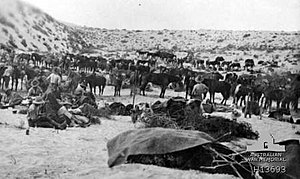Battle of Romani
| Battle of Romani | |||||||
|---|---|---|---|---|---|---|---|
| Part of the Middle Eastern theatre of World War I | |||||||
 8th Light Horse Regiment at Romani |
|||||||
|
|||||||
| Belligerents | |||||||
|
|
|||||||
| Commanders and leaders | |||||||
|
|
|
||||||
| Units involved | |||||||
|
Anzac Mounted Division's 1st Light Horse Brigade 2nd Light Horse Brigade 52nd (Lowland) Division |
3rd Division Pasha I Ottoman camels Machine gun battalion |
||||||
| Strength | |||||||
| 14,000 | 16,000 | ||||||
| Casualties and losses | |||||||
| 1,130 | 9,200 including 4,000 prisoners | ||||||
The Battle of Romani was the last ground attack of the Central Powers on the Suez Canal at the beginning of the Sinai and Palestine Campaign during the First World War. The battle was fought between 3 and 5 August 1916 near the Egyptian town of Romani and the site of ancient Pelusium on the Sinai Peninsula, 23 miles (37 km) east of the Suez Canal. This victory by the 52nd (Lowland) Division and the Anzac Mounted Division of the Egyptian Expeditionary Force (EEF) over a joint Ottoman and German force, which had marched across the Sinai, marked the end of the Defence of the Suez Canal campaign, also known as the Offensive zur Eroberung des Suezkanals and the İkinci Kanal Harekâtı, which had begun on 26 January 1915.
This British Empire victory, the first against the Ottoman Empire in the war, ensured the safety of the Suez Canal from ground attacks, and ended the Central Powers' ambitions of disrupting traffic through the canal by gaining control of the strategically important northern approaches to the Suez Canal. The pursuit by the Anzac Mounted Division which ended at Bir el Abd on 12 August began the Sinai and Palestine Campaign. Thereafter, the Anzac Mounted Division supported by the Imperial Camel Brigade were on the offensive, pursuing the German and Ottoman army many miles across the Sinai Peninsula, reversing in a most emphatic manner the defeat suffered at Katia three months earlier.
...
Wikipedia
